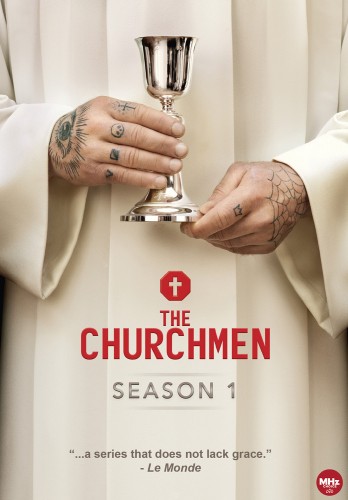The Churchmen — Season 1, Episode 3 Recap
One reason that religion doesn’t usually play well on television is that unless a show is focused on religion, a single character usually has to stand in as the representative example of his or her tradition. Unless that character is the protagonist (and sometimes even then), the character is going to be sketchily defined to begin with: the God-hounded skeptic in Joan of Arcadia, the virginal good-girl in L.A. Law, the good pastor in Little House on the Prairie, the bad pastor in…just about any episode of Law & Order. When and where religion has been most interestingly on display in American television, faith has been distributed to allow for nuances and even conflicts between participants. For example, differences in religious expression were a cause of tension in an oftentimes idealized marriage between John and Olivia Walton. More recently, children’s religious convictions have puzzled, infuriated, and provoked their parents in The Good Wife and The Americans.
In its first three episodes, The Churchmen has done an above-average job of differentiating between the seminarians. Yann and (especially) Emmanuel appear a bit softer, more timid. Jose, Raphael, and Guillaume a bit more assertive. In Episode Two, we saw Emmanuel freeze up when another volunteer was assaulted at Notre Dame. Here, we get details about his adoption and some of the reasons for his parents’ concerns for his mental health. Yann meets a young musician at school, and his squeamishness at some of her punk music lyrics is actually more sweet than sanctimonious.
But lest we think all religious people are marshmallows, we see Raphael try to head off the scapegoating of his brother for his father’s shady business practices, and Jose confront a hostile group of fellow students getting ready to walk out of class because the seminarians pose a threat to “secularist” education. The latter was probably my favorite scene in The Churchmen so far, not only because its depiction of Christians being ostracized and belittled in an educational environment was about ten times more credible than that of God’s Not Dead, but because the one who ends up being the spokesperson for the religious viewpoint ends up being the seminarian who has himself been met with hostility and suspicion by his more orthodox colleagues. (Though, to be fair, Yann’s idealism makes him shocked at his more suspicious and cynical colleagues in the previous episode; he may have a more idealized view of Christian community, but he does try to live it out.)
 That internal conflicts are a bit more nuanced than conflicts between Christians and outsiders is also seen in the conflict between Father Fromenger and Monsignor Roman. A chunk of Episode Three deals with the Vatican investigation in the the practices of the Capuchin, and one of the investigators admits to Fromenger that he is being treated unfairly. He suggests the priest take a position in Shanghai as a sort of half-retirement/half-exile. I don’t have enough (any) knowledge of the inner workings of the Roman Catholic Church to know how credible this subplot is–would the Vatican really send a team of auditors on just the word of the Monsignor? Would none of the investigators or staff report to the Monsignor’s superior that he has a vendetta? Roman is probably the most one-dimensional character thus far, but his response when he receives Fromenger’s letter is tantalizingly ambiguous.
That internal conflicts are a bit more nuanced than conflicts between Christians and outsiders is also seen in the conflict between Father Fromenger and Monsignor Roman. A chunk of Episode Three deals with the Vatican investigation in the the practices of the Capuchin, and one of the investigators admits to Fromenger that he is being treated unfairly. He suggests the priest take a position in Shanghai as a sort of half-retirement/half-exile. I don’t have enough (any) knowledge of the inner workings of the Roman Catholic Church to know how credible this subplot is–would the Vatican really send a team of auditors on just the word of the Monsignor? Would none of the investigators or staff report to the Monsignor’s superior that he has a vendetta? Roman is probably the most one-dimensional character thus far, but his response when he receives Fromenger’s letter is tantalizingly ambiguous.
Finally, we get a conflict between two of teachers at the seminary. Honoré is frightened of being questioned by the Vatican’s auditors. He alludes to a paper Fromenger wrote about birth-control, but it is unclear whether or not this is a reference to an as yet undiscovered time-bomb or simply the over-reactions of a simple, old man too close to retirement. Fromenger’s assistant has visible contempt for Honoré, and he is frustrated at having to nurse the old man after a fainting spell lands him in the hospital. He would rather be working on his sermon for the day of prayer.
The conflict between the two priests is an interesting reversal of that between the seminarians. Honoré’s softer, apolitical nature comes across as scared and naive, but it is his lecture, not his colleagues more prized sermon, that inspires Emmanuel to confess his sin. The message, then, appears to be that no one personality or approach is the right one but that soft and hard, cynical and naive, scared and aggressive, each have their advantageous and drawbacks. Fromenger may come closest to uniting the various poles, but mostly this is a show about the church, so it seems fitting that the true balance is found not in one perfect individual but in the harmonious, if precarious, cooperation among like-minded believers.

